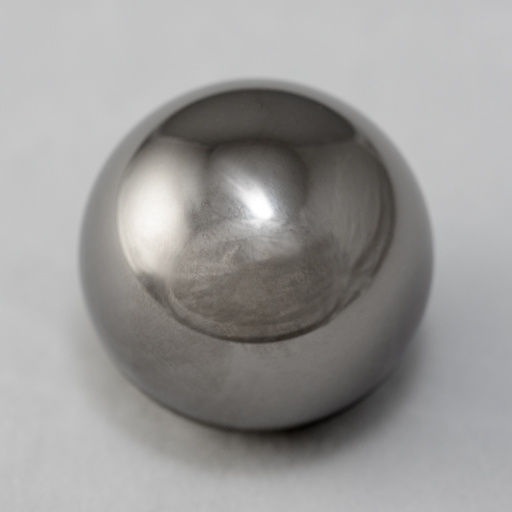Steel Balls
Tool Steel (Rock Bit AISI S-2)
Rock Bit S-2 Tool Steel balls are designed to work well in very extreme conditions that are common when drilling deep into the ground. The balls provide the strength and toughness that is required to withstand heavy force and the abrasion of pulverized rock. These balls also have unusually good wear characteristics due to the materials hardening capabilities.
Rock Bit S-2 Tool Steel balls are manufactured for bearings that are used in well drilling, oil field drilling and equipment and offshore drilling platforms.
Stainless Steel
AISI type 302 stainless steel balls are for applications where good corrosion resistance is important, but hardness is not. They offer good resistance to atmospheric corrosion, dyes, food, environmental sterilizing solutions and many organic and inorganic materials.
AISI type 304 stainless steel balls are used where good corrosion resistance is important, but hardness is not. They offer good resistance to atmospheric corrosion, dyes, food environments, sterilizing solutions and many organic and inorganic materials.
AISI type 316 stainless steel balls offer excellent corrosion resistance and resistance to sulphuric acid compounds. This austenitic steel includes 2-3% molybdenum.
AISI type 316L stainless steel has a lower carbon content than 316 stainless, which gives it even higher corrosion resistance than the excellent resistance of type 316. Both types offer excellent resistance to sulphuric acid compounds.
AISI type 316LVM (low carbon vacuum melt) stainless steel, regarded as a medical grade, this stainless steel is vacuum melted to is vacuum achieve high levels of purity and cleanliness. It has excellent resistance to both general and intergranular corrosion, and pitting and crevice corrosion. The vacuum melt allows for superior surface finish.
AISI type 430 stainless steel balls provide fair to-good corrosion resistance. They resist corrosion from fresh water, steam, food environments, dairy products, nitric acid and many petroleum products and organic material.
AISI type 420 stainless steel balls have fair-to-good corrosion resistance and good material strength. They resist corrosion from alcohol, ammonia, food environments, fresh water, many petroleum products and organic materials and some mild acid environments.
AISI type 440C stainless steel balls offer the maximum in material strength and fair corrosion resistance. They resist alcohol, food environments, fresh water, many petroleum products, organic materials and steam.
AISI Nitronic 50 stainless steel is an austenitic stainless steel offering a blend of strength and superior corrosion resistance. Unlike many stainless steels, Nitronic 50 does not become magnetic when cold-worked.
Type 904L is a very corrosion resistant stainless steel. The “L” stands for low carbon (0.030% or less). Type 904L is also an austenitic alloy. It combines nickel, chromium molybdenum and copper with iron for tremendous resistance to corrosion.
AISI 17-4 PH (Precipitation Hardening) stainless steel. 17-4 Precipitation Hardening also known as Type 630 is a chromium-copper precipitation hardening stainless steel used for applications requiring high strength and a moderate level of corrosion resistance. High strength is maintained to approximately 600 degrees Fahrenheit (316 degrees Celsius).
Carbon Steel
AISI Type 1018 carbon steel balls are available in grades 100,500,1000, and 2000. These balls feature a minimum hardness of 60 Rockwell C. The chemical composition of these balls includes 0.15% – 0.20% carbon.
AISI Type 1015 carbon steel balls are available in grades 100,500,1000, and 2000. These balls feature a minimum hardness of 60 Rockwell C. The chemical composition of these balls includes 0.13% – 0.18% carbon.
Chrome Steel (AISI Type 52100)
AISI Type 52100 Chrome Steel is used in the ball and roller bearing industry and for a variety of automobile applications. These Chrome Steel Balls have excellent surface quality. They offer superior wear resistance, high hardness and high load bearing capacity as a result of through-hardening. The chemical composition of these balls includes 1.30% – 1.60% chromium.

